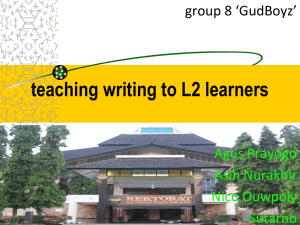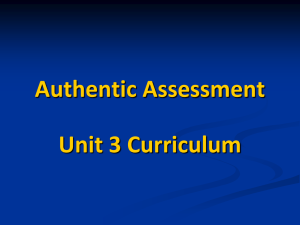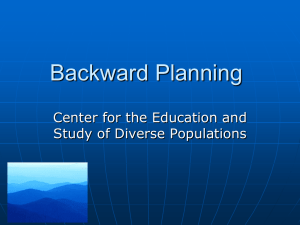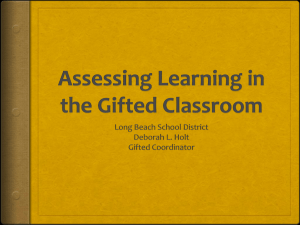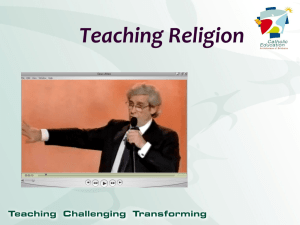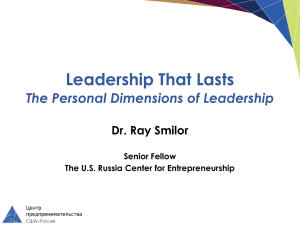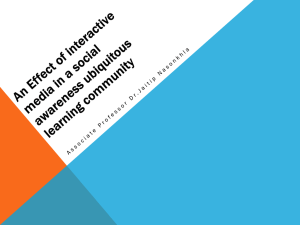Authentic Youth Engagement in Case Planning
advertisement
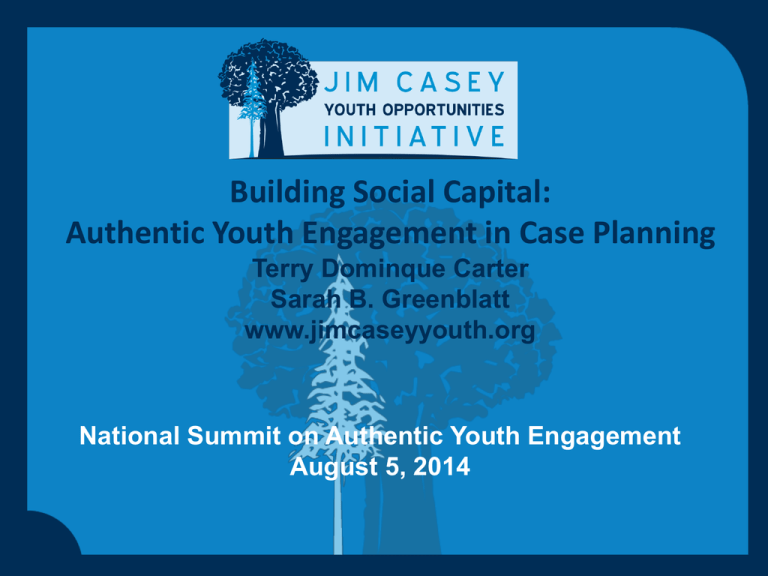
Building Social Capital: Authentic Youth Engagement in Case Planning Terry Dominque Carter Sarah B. Greenblatt www.jimcaseyyouth.org National Summit on Authentic Youth Engagement August 5, 2014 Building Social Capital: Authentic Youth Engagement in Case Planning Today’s Focus • Welcome/Overview – Who We Are • Research on Adolescent Development & Trauma • Authentic Youth Engagement in Case Planning CAN improve outcomes and build needed social capital • Terry’s authentic engagement in case planning to improve outcomes and build social capital • Discussion 2 Who We Are: Jim Casey Initiative 18 Site Locations - Young people transitioning from foster care14-26 Jim Casey Initiative Improved Outcomes • Permanence • Education • Employment • Housing • Health & Mental Health • Financial Capability • Social Capital 4 Jim Casey Initiative Five Core Strategies Improved Youth Outcomes Improved Policies and Practices • • • • • • • 6 Connections to Supportive Family Relationships Access to Racially Equitable Services & Supports Stable Secondary and Post-Secondary Education Opportunities to Achieve Economic Success Safe, Stable, Affordable Place to Live Access to Quality Physical and Mental Health Care Opportunities to Shape Their Own Future Our Premise Emerging research on trauma and its impact on adolescent brain development indicates that youth in foster care can benefit from authentic engagement in case planning that prepares and supports them while providing opportunities to build social capital as they transition to adulthood – and beyond! Building Social Capital through authentic youth engagement in case planning is likely to prevent the poor outcomes experienced by youth who emancipate on their own at 18 … or even 21. This work takes skilled professionals with a clear understanding of adolescent and young adult development, knowledge of the processes of major life transitions, and the ability to work in a team with cultural competence and awareness. 7 Authentic Youth Engagement in Case Planning Relies on an Understanding of Adolescent Development and the Impact of Trauma Research About Emerging Adulthood Emerging research about the Adolescent Brain IT IS NOT DONE YET! 10 10 Gradual brain development in adolescence & emerging adulthood presents multiple opportunities for growth & change • 1111 What We Know About … Adolescents in Foster Care Today • • • • 12 Almost ½ of close to 400,000 children in care Most enter as teens and stay Disproportionately of color and poor Nationally, close to 25,000 a year emancipate alone…with limited supports they can count on What we Also Know About Adolescents in Foster Care Today … Trauma Survivors Have experienced trauma before & after placement • • • • • • 13 Persistent poverty, discrimination, abuse & neglect Multiple moves & relationship disruptions in care Resulting ambiguous losses and unresolved grief Confusion about what happened and identity formation Multiple developmental & educational delays Poor outcomes compared to peers not in foster care Understanding Toxic Stress & Complex Trauma in Childhood and Adolescence Multiple Traumatic Events Timing of Events 14 14 Impacts the trajectory of over all child and adolescent development, brain development, behavior, and interactions with others as well as the capacity to trust, form positive identities and supportive relationships Neuroplasticity The impact of trauma is not permanent • There is no “point of no return” • Experiences positively or negatively influence transmission of brain cell messaging & development • The brain through positive experiences can be re-wired to support the development of trust and resilience 15 Resilience and Positive Youth Development Relationships and Experiences Matter • Build strong relationships with caring adults • Enhance a sense of belonging & a positive identity • Focus on youth’s strengths, culture, interests & capabilities • Support gradual learning of roles, responsibilities, & mastery of life skills • Embrace opportunities to learn from mistakes • Promote healthy social interaction and peer support 16 Experiences Matter The brain can be rewired to overcome impact of trauma and toxic stress • Neuroplasticity of the brain allows new positive experiences and relationships to overcome negative influences of past experiences • Positive relationships with caring adults can help youth heal from past hurts & build positive coping skills • Authentic Youth Engagement in Case Planning can be the bridge to healing and supportive relationships 17 Without Positive Relationships & Experiences Youth ‘aging out’ at 18 - or 21 - are likely to experience poor outcomes • • • • • • • • 18 Limited family connections & support; Low high school graduation rates Low college attendance and completion Early unplanned pregnancies Limited access to quality health care Trauma-related mental health challenges Homelessness Involvement with the criminal justice system Authentic Youth Engagement in Case Planning Builds Positive Identity AND Social Capital Through a Culturally Aware & Trauma-Informed Teaming Process Federal Case Planning Practice Framework Meeting the developmental needs of older youth & young adults • Safety – Physical – Psychological • Permanency – Consistent Family and Family-Like Relationships (e.g. birth family, relatives, guardians, adoptive families, and other supportive adult connections ) – Continuity in Relationships with Supportive Adults – Emotional Security and Identity Formation • Well-being – Formal and Informal Support Networks • Social capital – Services to support successful developmental outcomes • Education, Health, Mental Health – Mastery of life skills and competencies • Education, vocational training, employment, financial capability, housing Authentic Youth Engagement in Case Planning to Build Social Capital - REVIEW Definitions: Authentic Youth Engagement 1. The process of genuinely working with young people and empowering them to be the decision-makers in their own lives. 2. A partnership between caring adults and young people empowering each young person to direct his or her own future 21 Authentic Youth Engagement Values • Preparation – young people are prepared and empowered to make informed decisions about matters that affect their lives • Support – young people are provided with customized services and a network of supportive relationships that meet their needs and promote a healthy transition to adulthood • Opportunity – young people are provided with an array of life opportunities that promote optimal growth and development; experiential learning; healthy risk taking and participation in normal everyday activities that contribute to social confidence and positive identity formation. 22 Case Planning that Builds Social Capital Networks of relationships for a reason, a season & a lifetime • Quantity • Quality • Reciprocity • Value 23 Young Adults’ Vision of Quality Case Planning “Nothing about us without us” • • • • • • • We have a team of people to help us, choosing some, if not most, of our team members We establish our own future goals. We state what we can do and ask the team for help with other things. Our teams meet regularly to review progress that has been made and next steps. We are supported in building and maintaining relationships and provided with opportunities to address the barriers we may face in doing so. We gradually experience increasing challenge and responsibility and decreasing protection as we practice adult roles and responsibilities. We have safe opportunities for self-exploration to understand our past experiences, our present needs, our connections within community, and we feel accepted for who we are even as we make mistakes Jim Casey Youth Opportunities Initiative, Quality Casey Planning with Young Adults in Extended Care – DRAFT, 2014 24 Authentic Youth Engagement in Case Planning to Build Social Capital Transitions Framework • Builds relationships and experiences youth need for a healthy transition to adulthood – and beyond • Acknowledges multiple transitions youth in foster care have experienced • Provides opportunity to use transition planning as an engaging & positive experience • Supports youth through a process of understanding the value of planned endings, stabilizing realignments, and new beginnings Bridges, W. (2009). Managing transitions: Making the most of change (3rd Edition). London: Nicolas Brealey. 25 Building Social Capital and Identity Formation: Authentic Youth Engagement in Case Planning Help Youth Find Answers to 6 key questions: To make new meaning of their trauma and current life experiences… 1. 2. 3. 4. 5. 6. Who am I? What happened to me? Where am I going? How will I get there? Who will support me along the way? How and when will I know I belong? Adapted from 3.5.7 Model, Darla Henry (2005) 26 Building Social Capital: Authentic Youth Engagement in Case Planning Our Policy and Practice Expectations Statewide policy and practice fully promotes authentic youth engagement in case planning by requiring a team planning approach with all young people in foster care age 14 and older Nothing About Us Without Us! 27 Building Social Capital: Authentic Youth Engagement in Case Planning Team Planning Approach • Youth are viewed as partners in team planning • Youth identify team members who know and care about them – from past and present formal and informal networks • Youth are prepared to gradually guide team planning • Team members are prepared and supported to work together to build youth’s gradual autonomy and selfdetermination Jim Casey Youth Opportunities Initiative, Quality Casey Planning with Young Adults in Extended Care – DRAFT, 2014 28 Building Social Capital: Authentic Youth Engagement in Case Planning Team Planning Approach • Team focuses on youth’s strengths, needs and desires to build transition plans that work for them – doing with, not for them • Youth are guided through a healing process of going back to move forward – building a healthy sense of identity and belonging • Team members serve as a bridge to relationships for a reason, a season and a lifetime: a network of SOCIAL CAPITAL Jim Casey Youth Opportunities Initiative, Quality Casey Planning with Young Adults in Extended Care – DRAFT, 2014 29 Building Social Capital: Authentic Youth Engagement in Case Planning Terry’s Team Planning What Does Authentic Youth Engagement Look Like? 30 Building Social Capital: Authentic Youth Engagement in Case Planning Terry’s Teaming Experiences • Authentic Youth Engagement • Planning Team • Social Capital • Recommendations 31 Authentic Youth Engagement in Case Planning Form Identity& to Build Social Capital Going Back to Move Forward Confront the dark parts of yourself, and work to banish them with illuminations and forgiveness. Your willingness to wrestle with your demons will cause your angels to sing. Use the pain as fuel, as a reminder of your strength. August Wilson 32 Building Social Capital: Authentic Youth Engagement in Case Planning Outcomes • Young people safely make sense of their story, make peace with their past, and make realistic transitions plans for their future • Young people are supported to gradually build the relationships, knowledge, skills and resources needed for a successful transition to adulthood – and beyond! • Young people have social capital – a supportive network of relationships for a reason, a season and a lifetime… Social Capital 33 Thank you! Terry Dominque Carter Sarah B. Greenblatt www.jimcaseyyouth.org
